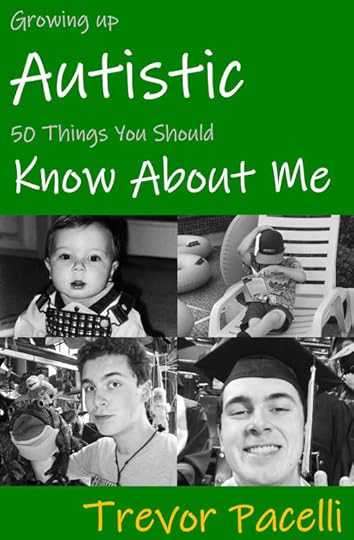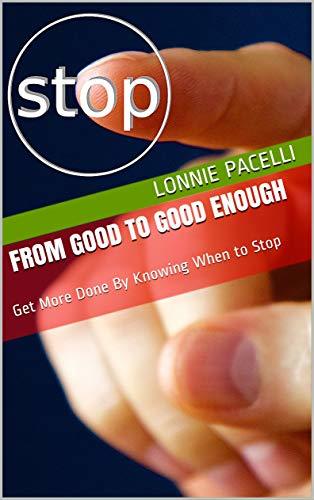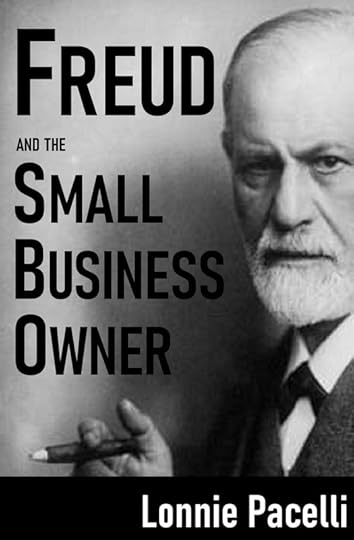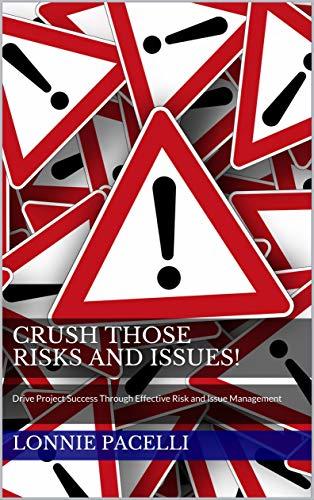Lonnie Pacelli's Blog, page 38
February 4, 2021
My Nine Life Lessons
 This one is a bit of a departure from my typical article topics.
This one is a bit of a departure from my typical article topics.Recently I wrote a book about what I call “good-enough contentment.” It’s an allegory about a forty-something man who is unhappy with his life. After a magical train ride, he learns to define what contentment means in nine areas of his life: career, family, health, friendships, finances, leisure, spirituality, giving, and legacy. Writing the story caused me to look back at my own life--the things I did well and the many mistakes I made. It inspired me to write about nine nuggets that I wish I could go back in time to tell my younger self. Some I would have done the same all over again, others radically different. All, however, are worth putting down in writing to spur your thinking about things you need to start, stop, or continue.
Here they are:
Career: Your career can’t take the place of family, health, leisure, and friendships – In the movie The Family Man, Nicholas Cage’s character is a hard-charging investment banker who gets to see what his life would have been like as a middle-class husband and father. He comes to realize that there’s much more to life than business. By all means, continue to vigorously pursue your career aspirations, but not at the expense of other important areas of your life.
Family: Don’t squander memories – My father worked very hard as a baker; so much so that he missed out on many family events. In his last years he told me how he regretted missing so many events and milestones with my five siblings and me. Don’t look back on your life regretting not being there for the memory makers.
Health: If you don’t decide to take care of yourself, the decision will be made for you – I had an emotional breakdown at age 30 due to running myself ragged both mentally and physically. I thought I could just keep pushing and tough things out. Wrong. I had no choice but to stop and make some changes to get myself healthy again. If you don’t focus on taking care of your health, something out of your control will happen to force you into action.
Friendships: Have a couple of friends who would help you out at 2 am, no questions asked – Recently I was on vacation when a tenant in our rental property called and said the washing machine wasn’t working. I was 3,000 miles away and couldn’t get there, so I called a dear friend who was at the rental in 30 minutes and addressed the problem. Having a couple of close friends you can rely on to help you out of a jam is worth gold. Being someone your friend can rely on is just as important.
Finances: No one cares about your finances more than you – When I graduated from college, I bought three books on investing. Those books formed the foundation for my investing discipline. At times, though, I let others who didn’t have my best interests at heart manage investments on my behalf. Now I manage every dollar myself and keep current on investment strategies. Putting your money in the hands of a paid advisor will ensure bread is put on his or her table along with your money. Do as much of this on your own as you can.
Leisure: Work/life balance means slowing down, not speeding up – I’ve known way too many people who worked 60+ hours during the week only to cram “life” activities in the weekend. They had work/life balance, but it was achieved by running 100 miles per hour. Leisure time should include time to relax and recharge, so use at least some of it to rest, and be careful about trying to fit too many things into your life.
Spirituality: Walk the talk on your beliefs – Whatever your spiritual beliefs (mine are Christian), don’t be a Jekyll and Hyde in what you say and what you do. Cursing up a storm in meetings during the work week then heading into church on Sunday just doesn’t square. It’s not about judging your belief system; it’s more about ensuring your actions align to your beliefs.
Giving: Give out of love, not out of convenience or obligation – My son loves to cook. He regularly volunteers to cook and deliver meals to families in need. He loves to give of his time and money to help families who need a hot meal enjoy his cooking. The quantity and type of giving is up to you, just do it out of love and enjoy the gratification you get in return.
Legacy: Live to your eulogy – A number of years ago I created a personal purpose statement. After a lot of soul searching, I came up with: I will work to help others to help themselves and not simply enable them. When I die, I want people to say three words at my funeral: He helped me. If you have a personal purpose or mission statement, live it. If you don’t have one, a book like The Purpose Driven Life might be helpful.
My hope is that you, my readers, might be able to glean something from my nine life lessons. If I help you do or think differently about some aspect of your life, then mission accomplished. Thank you for helping me live out my purpose statement.
Published on February 04, 2021 02:43
January 29, 2021
Free 2/3-4: Growing Up Autistic-50 Things You Should Know About Me
 Free 2/3-4: Growing Up Autistic-50 Things You Should Know About Me
Free 2/3-4: Growing Up Autistic-50 Things You Should Know About MeGet it at https://amzn.to/2DPuGR8
#freebook #kindle #kindlefire #ebooks #ebook #Kindlefreebooks #Kindledeals #FREE #mustread #goodreads #greatreads #freebie #freebies #kindlebook #ad #autism #autistic #Asperger #ASD
Published on January 29, 2021 03:12
LinkPitching – Seven Fatal Errors LinkedIn Users Commit Every Day
 A LinkedIn interaction from some time back still sticks with me today. Why? He and I connected, then he immediately asked to review my personal finances so he could do for me what he had allegedly done for so many other “thrilled customers.” I told him “No thanks.” He replied back asking me why. Being the direct guy I am, I told him I thought it was insincere to connect with me and immediately want to review my personal finances and try to sell me on his service. He said he never asked me to send my personal finances through LinkedIn). At this point, the discussion was no longer about him trying to sell me a service; instead, I wanted to provide a teachable moment for him. I told him that sending personal finances through LinkedIn wasn’t the issue, but I didn’t want to divulge my personal finances to someone I didn’t even know who connected with me only 30 minutes ago. After another couple of interactions, he told me that “nice people” would agree to meet with him (I guess I’m not a nice person) and that he was rescinding his offer to meet (even though I already told him I didn’t want to meet with him). It was kind of like “you can’t break up with me because I’m breaking up with you first”. He then wished me the best. He made an impression on me for sure, just not one he wanted.
A LinkedIn interaction from some time back still sticks with me today. Why? He and I connected, then he immediately asked to review my personal finances so he could do for me what he had allegedly done for so many other “thrilled customers.” I told him “No thanks.” He replied back asking me why. Being the direct guy I am, I told him I thought it was insincere to connect with me and immediately want to review my personal finances and try to sell me on his service. He said he never asked me to send my personal finances through LinkedIn). At this point, the discussion was no longer about him trying to sell me a service; instead, I wanted to provide a teachable moment for him. I told him that sending personal finances through LinkedIn wasn’t the issue, but I didn’t want to divulge my personal finances to someone I didn’t even know who connected with me only 30 minutes ago. After another couple of interactions, he told me that “nice people” would agree to meet with him (I guess I’m not a nice person) and that he was rescinding his offer to meet (even though I already told him I didn’t want to meet with him). It was kind of like “you can’t break up with me because I’m breaking up with you first”. He then wished me the best. He made an impression on me for sure, just not one he wanted.As of this writing, LinkedIn has over 600 million users and has become a dominant force in connecting people to do business with each other. It has disrupted geographic barriers, so that someone in his basement in Cleveland can do business with someone in Los Angeles, Paris, or Bangalore. It’s also insanely cheap and easy to establish a platform and reach potential customers who 20 years ago would have been out of reach. This low barrier to entry and massive audience potential is fertile ground for ambitious businesspeople (who I refer to as LinkPitchers) to canvass large populations for business. Now I’m in no way telling the ambitious to not pursue business using LinkedIn with all their passion and energy. But there are right and wrong ways to do it.
My years of LinkedIn experience have led me to seven fatal errors LinkPitchers make:
Not understanding my profile – I know this may sound like a “no duh” but I’m amazed at how many people send me canned messages that prove they didn’t even look at my profile. My LinkedIn banner says “Lonnie Pacelli, Author” next to my published books. Yet I regularly get messages asking if I’d ever considered becoming an author. Before you solicit make sure you take a few minutes to understand what the person actually does.Not putting space between a request to connect and a follow-up – A request to connect followed immediately with a pitch tells me you’re not at all interested in me; you’re just trolling for business. Putting space between the two at least creates the illusion you’ve taken time to research me.Not demonstrating you know something about me – Some of the most effective LinkedIn messages I’ve received establish some sort of connection with topics I write about. I write a lot about autism and disability inclusion, so when I get a message asking about autism or telling me they have a child on the spectrum, I’m more likely to respond.Not asking personal questions before you’ve established rapport – Sorry, but just because I connected with you on LinkedIn doesn’t mean in the next breath I’m going to tell you about my financial goals. It takes time to develop trust in a relationship. Even if you’re a connection of a connection, it doesn’t mean I’m willing to divulge anything to you beyond my profile.Not being sincere about why you’re following up – An insincere, boilerplate compliment like “I’m really impressed with and I can generate 20k leads a month for you” screams slimy salesperson. I’d feel much better getting a message like, “Thanks for connecting with me. I’m interested in what you have to say and look forward to reading your posts to see if there’s common ground for us to do business together.”Not having the stripes to do what you’re selling – If you send me a request to connect, I’ll look at your business, education, and experience. If you’re billing yourself as a financial advisor but have minimal relevant education or professional experience, I probably won’t want to do business with you.Not taking a hint – If you don’t get a response, don’t keep sending “I’m sure you’re very busy and you might have not seen my prior message to you” messages. I saw the message and decided not to pursue it. Sending additional messages will not make my view of you more favorable.
By all means use LinkedIn and the powerful tools it can bring to your business. Just keep these seven fatal errors in mind during your next LinkPitching expedition.
Published on January 29, 2021 03:12
January 21, 2021
Free 1/27-28: From Good to Good Enough-Get More Done By Knowing When to Stop
 Free 1/27-28: From Good to Good Enough- Get More Done by Knowing When to Stop
Free 1/27-28: From Good to Good Enough- Get More Done by Knowing When to StopGet it at https://amzn.to/2OU6v4L
#freebook #leadership #kindle #kindlefire #ebooks #ebook #Kindlefreebooks #Kindledeals #FREE #mustread #goodreads #greatreads #freebie #freebies #kindlebook #ad #teamwork
Published on January 21, 2021 02:49
In-Person Jekyll, Social Media Hyde
 Ahh, social media. Where from the comfort of your living room you can make your point known to millions of people. People and businesses have grown from being virtual unknowns to worldwide phenoms (think “Gangnam Style”) thanks to social media. Then there are those who fell from grace like a lead balloon (think Roseanne Barr, Anthony Weiner, or Paula Deen) because of social media. Both the rises and falls can happen swiftly and without advance warning. Sadly, it doesn’t even have to be true. Fake news travels just as fast as the truth. It just has to be tantalizing. It also doesn’t even have to go viral; a handful of viewers can see something that will alter their opinions of the person posting.
Ahh, social media. Where from the comfort of your living room you can make your point known to millions of people. People and businesses have grown from being virtual unknowns to worldwide phenoms (think “Gangnam Style”) thanks to social media. Then there are those who fell from grace like a lead balloon (think Roseanne Barr, Anthony Weiner, or Paula Deen) because of social media. Both the rises and falls can happen swiftly and without advance warning. Sadly, it doesn’t even have to be true. Fake news travels just as fast as the truth. It just has to be tantalizing. It also doesn’t even have to go viral; a handful of viewers can see something that will alter their opinions of the person posting.That viewer could be your current or future boss, customer, or business partner.
Before I go any further, I want to be very careful to treat this topic with respect and not take sides on any political, religious, or social issue. My goal is to shine a light on social media and how it could impact your professional livelihood, not to tell you a point of view is right or wrong.
Let’s pretend you are a businessperson who would like me as a customer. You and I have met for coffee several times and we seem to hit it off. You friend me on Facebook, wanting to get to know me better to understand how you could help solve my business problems and earn my trust in a business relationship. After we become connected on social media, I see very passionate posts from you mocking a point of view that I hold and telling people like me that we must be idiots to support such a heinous position. You then say something like, “If you believe in then unfriend me now!” As your prospective customer, I am confused by how someone who is so nice face to face (Dr. Jekyll) can be so venomous on social media, even giving an ultimatum (Mr. Hyde). I ultimately decide to not do business with you, not because you hold a particular point of view, but because you berate others who believe something different.
In looking at the above scenario, there are a few business relationship guiding principles that seem to go out the window with many on social media:
Not everyone thinks the same way as you.Just because you have an opinion doesn’t mean the world needs to know about it.When your posts are vague or generalized, you leave it up to the reader to decide what you meant, which could be quite different from what you meant to convey.You can be denied a job because of questionable social media posts. According to a survey sponsored by The Manifest, 90% of employers look at potential employees’ social media profiles and 79% have rejected a candidate based on what they found.If you’re trying to sell an idea or convince people to act a certain way, you shouldn’t do it by telling them what an idiot they are.
I want to illustrate this last point. Imagine walking into a car dealer and the salesperson greets you at the door. You tell him you want to buy a car and he asks you what you’re currently driving. You take him out to your car and he proceeds to tell you how ugly the car is and what a fool you are for driving such a repulsive vehicle. Do you view this person as credible and want to buy a car from him? I’d venture to say not a chance. Yet this is what I see over and over again on social media. People rip other points of view to shreds and berate all who believe in those views, rather than simply extolling the positive benefits of their own view.
When you post on social media, keep the following five takeaways in mind:
Assume everyone sees everything – I’ve heard some businesspeople with both business and personal profiles use that as license to be unfiltered on personal profiles and more restrained on business profiles. The problem is the two aren’t always mutually exclusive. There are plenty of people I know in my business life with connections on both our personal and business profiles. What I see posted on their personal profiles influences how I think about them in a professional setting. Sadly, some I admired professionally have had their credibility hurt because of what they say on personal social media profiles.Be clear on what you post and why – Personally, I love posting pictures of places we travel, experiences we have, and meals we eat. We do it largely to let friends know what’s going on with us and for some good harmless fun. We also have a happy hour review website where we post reviews of local restaurant happy hours which we’ve been told help others in the area decide where to go for happy hour. Professionally I post information about our different businesses to engage current and future customers.Knowledge is knowing what to say, wisdom is knowing when (or if) to say it – Just because you have a point of view on something doesn’t mean the world needs to know about it. I know a number of professional people who choose not to discuss their social, political, or religious views on social media. Wise move.Assume it lives forever – Platforms like Instagram have stories that disappear after a set timeframe. That won’t stop someone from taking a screenshot of the post and sharing it somewhere else. Assume anything you post will live forever and could come back to bite you.Resist posting when upset or impaired – There are plenty of examples where someone posted something only to have to apologize later for a “lapse in judgment.” Meanwhile, the post goes viral, then the person tries to delete it in vain after it’s been screenshot and shared over and over again.
No argument that social media is a critical tool for advancing your point of view and building your business and professional platform. Just avoid being an in-person Jekyll and social media Hyde.
Published on January 21, 2021 02:49
January 15, 2021
Free 1/20-21: Freud and the Small Business Owner
 Free 1/20-21: Freud and the Small Business Owner
Free 1/20-21: Freud and the Small Business OwnerGet it at https://amzn.to/2OVjQd8
#freebook #entrepreneur #startup #kindle #kindlefire #Kindlefreebooks #Kindledeals #FREE #mustread #goodreads #greatreads #freebie #freebies #kindlebook #ebooks #ebook
Published on January 15, 2021 02:48
The Very Real Consequences of Evasive Answers
 Some time back I was in a meeting with a project manager who presented the status on his troubled project to the project sponsor and other executive stakeholders. This project was of high interest to the sponsor and stakeholders as they were depending on its successful completion to make some major changes in their respective organizations. The project sponsor asked the project manager a very straightforward question:
Some time back I was in a meeting with a project manager who presented the status on his troubled project to the project sponsor and other executive stakeholders. This project was of high interest to the sponsor and stakeholders as they were depending on its successful completion to make some major changes in their respective organizations. The project sponsor asked the project manager a very straightforward question:Why is the project slipping?
The project manager went into a long, meandering monologue. The sponsor interrupted and asked the question again. More meandering from the project manager. Seeing the sponsor and other stakeholders’ growing frustration, the project manager’s boss stepped in and said they needed to do more homework and would come back the next day better prepared. The next day, the project manager’s boss presented the status and answered questions--along with a new project manager.
Through my career I’ve seen (and been in) plenty of situations where an exec’s (who I will refer to as “the asker”) questions were met with evasive responses. It could be that the person being asked (“the askee”) didn’t want to admit not knowing something or be proven wrong. The askee would then, as we liked to say in the consulting world, “tap dance” to attempt any response that might satisfy the asker. More often than not, the asker would grow frustrated with the evasiveness. This led me to the following hypothesis:
If an asker asks a question, the asker expects a direct answer.
When an askee is evasive, the askee leaves it to the asker to make up his/her own answer.
The askee has not only damaged his/her credibility, but now has to change the asker’s perception of the answer.
While my focus is in executive interaction, the same principle applies to other relationships like spouses or business partners. When an askee is evasive, the asker makes up his/her own answer, and the askee now has to dig out of a hole to reestablish credibility and set the record straight.
Need to build your answering skills? Keep the following eight tips in mind:Listen first then answer – Take the time to listen to a question without interrupting the asker, then when the asker is finished, give a response. Resist the urge to interrupt to get your answer in.Do ensure clarity – If you truly don’t understand a question, then by all means ask for clarification. But don’t continually ask for clarity; it could look like you’re deflecting.Give straight answers – If you’re asked a direct yes/no question, give a yes/no response. If there are contextual factors that support the answer or conditions that may change the answer, then provide them--concisely. And please don’t say, “It depends” without qualification.Don’t reframe – Saying something like “The question you should be asking is . . .” immediately conveys that you think the asker isn’t intelligent enough to ask the right questions. Acknowledge the question, respond, and move on.Don’t deflect – Changing the topic to avoid answering a question may work if the asker can be distracted, but usually the asker can sniff out when someone is avoiding a question by changing the topic. Do it once and you’ll probably get some grace for innocently not understanding the question; do it two or more times and you’ll be viewed as an avoider.Don’t attack validity – Saying something like, “That’s not important,” or “You shouldn’t ask that,” tells the asker you believe his or her intelligence is inferior to yours. If the asker is taking the time to ask a question, then assume the question is important to him/her.Say “I don’t know” – If you don’t know the answer to a question then be quick to say “I don’t know, I need to get back to you.” Then record the question and be prepared for a “When will you know?” follow-up from the asker.Be quick to admit if you’re not prepared – Too many “I don’t knows” may mean you have to do more research. It’s best to avoid this by being clear on the topic and prepared to discuss it. One humiliating abrupt ending to a meeting with a “you need to do more homework” directive will motivate you to not let it happen again.
This bears repeating: the consequences of evasive answers not only means the asker makes up his/her own answer, it also harms the askee’s credibility. Give straight answers and control the narrative.
Published on January 15, 2021 02:48
January 8, 2021
Free 1/13-14: Don't Throw in the Towel, Throw Down the Gauntlet!
 Free 1/13-14: Don't Throw in the Towel, Throw Down the Gauntlet!
Free 1/13-14: Don't Throw in the Towel, Throw Down the Gauntlet!Get it at https://amzn.to/2DuT7SC
#freebook #leadership #kindle #kindlefire #ebooks #ebook #Kindlefreebooks #Kindledeals #FREE #mustread #goodreads #greatreads #freebie #freebies #kindlebook #ad #teamwork
Published on January 08, 2021 02:38
Six Crucial Lessons to Becoming and Staying a Trusted Advisor
 In a recent phone call I told the CEO of my insurance brokerage that after being a loyal customer for 15 years I had moved all my business to other providers. Given our long-standing relationship, I felt I owed him an explanation; not because I wanted to see someone fired, but because I wanted him to know my reasons for leaving so he could put any lessons learned to use.
In a recent phone call I told the CEO of my insurance brokerage that after being a loyal customer for 15 years I had moved all my business to other providers. Given our long-standing relationship, I felt I owed him an explanation; not because I wanted to see someone fired, but because I wanted him to know my reasons for leaving so he could put any lessons learned to use.It started about seven years ago when the person assigned to my business insurance seemed to lose interest in me. He wasn’t on top of my renewals, made me do work that he could have done for me, and didn’t competitively bid my insurance. I moved all of my business insurance to another agency. A similar issue happened in the past year with my personal insurance; I simply didn’t feel that I was important to my agent. The final nail in the coffin came when my bank notified me that my homeowners’ insurance had lapsed two months earlier without any notification from my insurance agent. I then reached out to another agency, who quickly bound coverage for me at 10 p.m. on a Saturday evening.
While the CEO of the original brokerage wasn’t happy that I moved my insurance business elsewhere, he was grateful I took the time to calmly and constructively give him feedback. We ended the call on a very cordial note, and I am confident that if we ever ran into each other at a coffee shop we’d shake hands and exchange regards.
I open with this story because for years I considered him and the agents at his company as trusted advisors. I openly shared my personal and business goals with them and believed they advised with my best interests at heart. But after a time I realized I didn’t feel important to them, and my personal and professional interests were no longer their primary concern. The people who were at one time my trusted advisors now had exactly none of my business.
So what’s a trusted advisor? In my four decades in business I’ve boiled it down to six crucial principles:Intently listens then thoughtfully acts – A trusted advisor takes the time to listen to the client, understand their perspective, and ask clarifying questions before drawing conclusions or providing advice.Never breaches confidences – A trusted advisor needs to provide an environment where the client knows sensitive information will not be discussed with others. Relationships can be irreparably harmed with just one confidence breach. Advises on what s/he knows, admits what s/he doesn’t know – A trusted advisor is confident in his/her abilities and skillsets, and freely admits when something is outside of his/her expertise area.Always keeps commitments – A trusted advisor always follows through on commitments when and how the client expects. Is courageously, respectfully candid – A trusted advisor doesn’t need to tell the client what they want to hear; but should courageously and respectfully tell the client what they need to hear. The trusted advisor’s job is to say what s/he thinks; the client’s job is to decide what to do with it.Takes the initiative with the client – A trusted advisor ensures time with the client is purposeful and productive, and resulting actions are followed up. Being a trusted advisor isn’t something clients (regardless of whether they’re internal or external to your organization) automatically grant; it takes a track record of demonstrating these six principles through actions that elevate someone to trusted advisor status. Following are six crucial lessons I’ve learned about what it takes become and continue as a trusted advisor:The last impression is just as important as the first – Sure, setting a positive first impression is critical to becoming a trusted advisor. However, every impression made thereafter is equally important. A great trusted advisor is consistent in the impressions s/he makes with a client. Whether it’s the first, second or hundredth impression, the trusted advisor is consistent in his/her level of performance and the client comes to expect great service.Treat the client like they are your most important client – If you take someone on as a client it’s your job to make them feel important. The client doesn’t care about other clients you serve and how much or little business they represent. Your job is to provide the agreed-upon services while making the client know their business matters to you.Focus on problems first then sales will follow – When I meet with a new client I ask them to think about the biggest three issues that keep them awake at night. During our meeting I am very up-front about the problems I think I can help with and those that are outside my wheelhouse. My ability to focus on the client’s problems and then determine if/how I can best help sets my foundation as a trusted advisor and secures consulting engagements.Align your urgency to the client’s urgency – In my opening story my new insurance advisor understood the urgency of binding my homeowner’s insurance quickly. He aligned his urgency to mine and got the job done. I’m now a raving fan.Follow up 100 percent of the time – This one’s really easy; if you say you’re going to do something by a specific date, for Pete’s sake do it. If there’s a good reason you can’t keep a commitment by an agreed-upon date, notify them as early as possible. Letting a due date come and go without any notification not only erodes your credibility but could also impact downstream activities that are dependent on your deliverable.Don’t hammer screws – You may have heard the phrase, “If all you have is a hammer, everything looks like a nail.” Your job as a trusted advisor is to know what you’re good at and what you’re not, then focus on solving problems you’re best qualified to solve. Overselling your expertise to take on work you’re not qualified to do is akin to trying to hammer screws. You’ve got the wrong tools for the job and can create problems for both yourself and the client when you’re ill-equipped to solve the client’s problem.
Becoming a trusted advisor is something that’s earned through behaviors and actions and can be quickly stripped away if taken for granted. Keep these lessons in mind to help you not just attain trusted advisor status, but keep it.
Published on January 08, 2021 02:38
December 31, 2020
Free 1/6-7: Crush Those Risks and Issues!
 Free 1/6-7: Crush Those Risks and Issues!
Free 1/6-7: Crush Those Risks and Issues!Get it at https://amzn.to/2S2E073
#freebook #leadership #kindle #kindlefire #ebooks #ebook #Kindlefreebooks #Kindledeals #FREE #mustread #goodreads #greatreads #freebie #freebies #kindlebook #ad #teamwork #projectmanagement
Published on December 31, 2020 02:34



